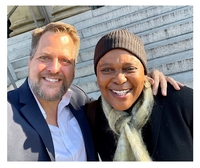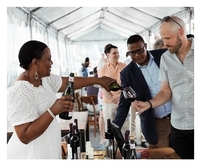"Every wine has a story" is prominently featured on the Go There Wines website, and is the refrain that informs their mission. There is always a tale to be told with wine, and every sip unveils the journey of the winemakers who guide the grapes from vine to bottle. Wine can tell stories of daily miracles, traditions, celebrations, and resilience. To ensure these stories are told, Go There Wines aims to provide a market for winemakers in underrepresented communities and wine regions. Many of the wines hail from areas that, through history, have been marginalized by war, politics, and poverty.
Go There Wines partnerships include wines from Abdullah Richi, a Syrian winemaker in exile who’s currently working in Lebanon; maverick sisters Baia and Gvantsa Abuladze, who are breaking the patriarchal winemaking mold in Georgia, and Nondumiso Pikashe, who runs Ses'Fikile Wines (an IsiXhosa word meaning “we have arrived”), and is pushing boundaries in Paarl, South Africa. Their wines reveal stories of dedicated, passionate winemakers challenging convention.
Bringing their own compelling stories to the project, Go There Wines was launched by husband and wife team Rose Previte, David Greene, and entrepreneur Chandler Arnold. Previte is a renowned restauranter behind award-winning Michelin-starred Maydan in Washington, DC, and Compass Rose. Greene is an award-winning journalist and
New York Times best-selling author. Greene co-founded Fearless Media and is former host of National Public Radio's
Morning Edition. Arnold has been a leader in the social impact space for 20-plus years, including leading progressive efforts with 15 Fortune 500 companies. Together, they debuted Go There Wines in 2022, where winemakers name their prices and receive 25 percent of the company’s profits. Most recently, they launched their no-commitment Drink Differently Wine Club, which offers a unique collection of six delicious bottles of Go There Wines delivered four times a year.

I had a chance to connect with Chandler Arnold and Nondumiso Pikashe to discuss their partnership and the purpose behind their work.
Miranda Franco (MF): What was the first step in launching an inclusive wine platform?
Chandler Arnold (CA): Our first step was to listen. Luckily, Rose had longstanding relationships with several incredible winemakers around the world. We focused on conversations with women winemakers, winemakers of color, and queer winemakers who were already making fantastic wines but whose businesses were—for the most part—still quite small. We heard stories about the struggles associated with producing in small volumes and how hard it was to compete against larger producers when you don’t own your land. Not to mention the challenges associated with being a woman or a person of color in a world where most decision makers are still straight white men. But we also heard amazing stories of hope. These stories were so moving to us that we made these winemaker’s stories the center of our labels and our brands.
MF: How important is the storytelling side of the wine industry—who produced the wine, and so forth?
CA: I don’t think the wine industry focuses enough on individual winemakers' stories, especially those who have been left out of these conversations for far too long. We are proud to focus on smaller winemakers who are deeply invested in their work. They are proud of what they produce and willing to put their name on the bottle to stand behind their work. This is one reason every one of our bottles includes a QR code that will take you to a short video of the winemaker introducing themselves and sharing their passion for the bottle you are holding in your hand. We know that any of our wines stand up to a blind taste test, but they taste even more incredible when you know the story behind what you are drinking.
M
F: How do you create interest in wines from marginalized groups?
CA: We didn’t set out to start a company. We want to create a movement. And do you know the great part? We don’t have to work hard to generate interest. When people hear about our model, and social mission and focus on amazing wines from women, people of color, and the queer community, they are excited to try them. And, once people try them, they are hooked. The challenge, however, has been getting the word out about these incredible folks because we are a small company with an even smaller budget. That’s why word of mouth is so important to us. So, tell your friends!
MF: What are you the proudest of about Go There Wines?
CA: I am a proud social innovation nerd and most excited about our unique business model. Not only do our winemakers name their prices—equal or better than market rates—they also receive payment upfront, giving them and their producers increased stability and job security. Additionally, our Go There Winemaker Profit Sharing Model ensures that 25% of our profits go straight to our winemakers—allowing them to further invest in their businesses, communities, and themselves.
MF: How did you get into the world of wine? What is it about that wine world that drew you in?
Nondumiso Pikashe (NP): I was born in the Western Cape, where most

South African Winelands are. I have been a part of the wine world that way, yet substantially and structurally removed from it. I “knew” about wine through my brother, who abused it and drank by the bottle to a drunken stupor. I then subsequently despised it. At the dawn of our democracy, I was exposed to mass media showing a different picture of wine. I resonated with its elegance, sophistication, and how it was presented for consumption. I was curious and wanted to explore the discrepancy between the view I had as a child and the now magnificent one.
MF: What was the winemaking scene like in South Africa when you started, compared to today?
NP: It was intimidating and a mystery. It was white and male and unwelcoming. However, there needed to be more strides in making it inclusive. There needed to be access to the industry value chain. There’s a bit of an opening, though, at a very slow pace, and a strategy for sustainable inclusion is still lacking. Ses'fikile is one tool for demystifying the South African wine industry and making it a heritage for all. There are attempts structurally to make it accessible, but ownership of means of production and land is still a sore point.
MF: What are the biggest challenges to being a winemaker in South Africa, and what lies ahead in one of the world's fastest-growing wine regions?
NP: Access to information about the world of wine to black people is challenging. The vicious cycle continues, and little is done to break it. Limited information and emphasis on natural science as the only point of entry into the wine space discourage their involvement in the value chain.
However, the future is bright for the South African wine industry as there are trends pointing toward rising consciousness and disruption of the status quo. South Africa competes meaningfully on the global platform with grape varieties like Pinotage and Chenin Blanc that are closely identified with the nation. Of note, check Ses'fikile’s Chenin Blanc / Roussanne as one of the top Decanter listings.
MF: Have you noticed a shift in the wine industry's representation of women and women of color? How do you see things progressing in the future?
NP: There is a shift that is observed with women occupying influential positions across the wine industry value chain: viticulturists, oenologists, sommeliers, cellar masters, exporters, etc. It will be a long while before we see a good representation of black women in the industry. Access is still closed, and the education system and disassociation with the industry marginalize them.
MF: How do you feel about partnering with Go There Wines, and what does this mean for you professionally and personally?
NP: Go There Wines’ business outlook speaks powerfully to my vision and represents the realization of Ses'fikile’s objectives. This partnership aligns with shared values of social impact, uplifting women and people of color, and acknowledging the underdog. We are changing the narrative for the better and amplifying the voice of social justice.